

They're growing. evolving. Carol Dweck. Carol S.
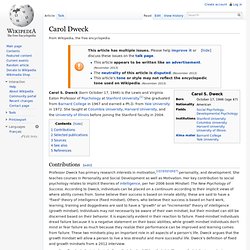
Dweck (born October 17, 1946) is the Lewis and Virginia Eaton Professor of Psychology at Stanford University.[1] She graduated from Barnard College in 1967 and earned a Ph.D. from Yale University in 1972. She taught at Columbia University, Harvard University, and the University of Illinois before joining the Stanford faculty in 2004. Contributions[edit] Professor Dweck has primary research interests in motivation,[2][3][4][5][6][7] personality, and development. She teaches courses in Personality and Social Development as well as Motivation. "In a fixed mindset students believe their basic abilities, their intelligence, their talents, are just fixed traits. This is important because (1) individuals with a "growth" theory are more likely to continue working hard despite setbacks and (2) individuals' theories of intelligence can be affected by subtle environmental cues.
Selected publications[edit] Dweck, C. Sources[edit] See also[edit] Goal orientation References[edit] Howard Gardner. Howard Earl Gardner (born July 11, 1943) is an American developmental psychologist and the John H. and Elisabeth A.
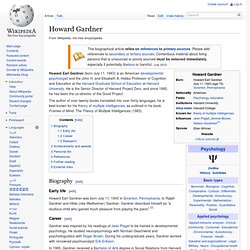
Hobbs Professor of Cognition and Education at the Harvard Graduate School of Education at Harvard University. He is the Senior Director of Harvard Project Zero, and since 1995, he has been the co-director of the Good Project. The author of over twenty books translated into over thirty languages, he is best known for his theory of multiple intelligences, as outlined in his book Frames of Mind: The Theory of Multiple Intelligences (1983). Biography[edit] Early life[edit] Howard Earl Gardner was born July 11, 1943 in Scranton, Pennsylvania, to Ralph Gardner and Hilde (née Weilheimer) Gardner.
Career[edit] In 1965, Gardner received a Bachelor of Arts degree in Social Relations from Harvard University. He began teaching at the Harvard Graduate School of Education in 1986. Research[edit] You are my horizon. The Final Frontier, HOW TO SURVIVE IN COLLEGE. The Final Frontier, 20 Essential Healthy Things To Keep In Your Dorm Room! Under 18 Volunteer Abroad Programmes. 25 Things You Should Know Before Starting College. Some of these things I knew before college.
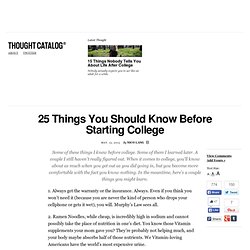
Some of them I learned later. A couple I still haven’t really figured out. When it comes to college, you’ll know about as much when you get out as you did going in, but you become more comfortable with the fact you know nothing. In the meantime, here’s a couple things you might learn. 50 Things To Do The Summer Before You Go To College. By Kelsey Mulvey Now that you’ve danced the night away at prom and graduated high school, the college countdown is officially a go.
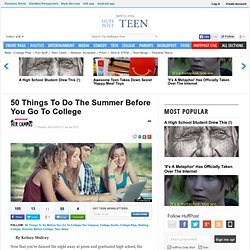
Though you may be itching to pack up your bags and start a new life at your new school, there’s another thing you’ve been looking forward to – the summer. While hitting the beach and finding a summer romance might still be a top priority, this summer will be different. AeroAstro: Department of Aeronautics and Astronautics. Education. Education Spanning five schools — architecture and planning; engineering; humanities, arts, and social sciences; management; and science — and more than 30 departments and programs, an education at MIT covers more than just science and technology.
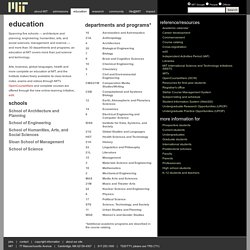
Arts, business, global languages, health and more complete an education at MIT, and the Institute makes freely available its class lecture notes, exams and videos through MIT's OpenCourseWare and complete courses are offered through the new online-learning initiative, edX. schools. Career-Oriented Education vs. the Liberal Arts - James Fallows. Readers weigh in with compelling opinions on Maine Maritime Academy, liberal-arts colleges, and big questions.
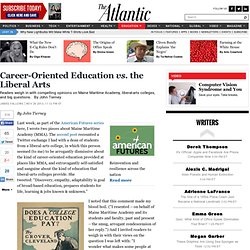
By John Tierney By John Tierney Reinvention and resilience across the nationRead more Last week, as part of the American Futures series here, I wrote two pieces about Maine Maritime Academy (MMA). The second post recounted a Twitter exchange I had with a dean of students from a liberal-arts college, in which this person seemed (to me) to be arrogantly dismissive about the kind of career-oriented education provided at places like MMA, and extravagantly self-satisfied and sanguine about the kind of education that liberal-arts colleges provide. I noted that this comment made my blood boil. I received scads of emails, many of them quite lengthy. Many readers were eager to make the point that an education at maritime academies is incredibly broadening, anything but narrow, and leads to experiences unlike anything most liberal-arts grads will ever get.
Engineering - Unistats. UCAS code: H10C KIS stands for Key Information Set.
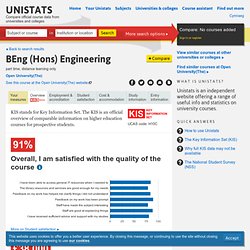
The KIS is an official overview of comparable information on higher education courses for prospective students. 91% Overall, I am satisfied with the quality of the course. More information:closeData from 160 students.Source: National Student Survey ...More on Student satisfaction £38,000 Average salary six months after the course . More information:closeData from 65 students.Source: Destinations of leavers from HE recordThere are not enough data available to give specific information for the course: this may be because the course size is small, or because it is a new course.
Opendays.com - university and college open days - home page.